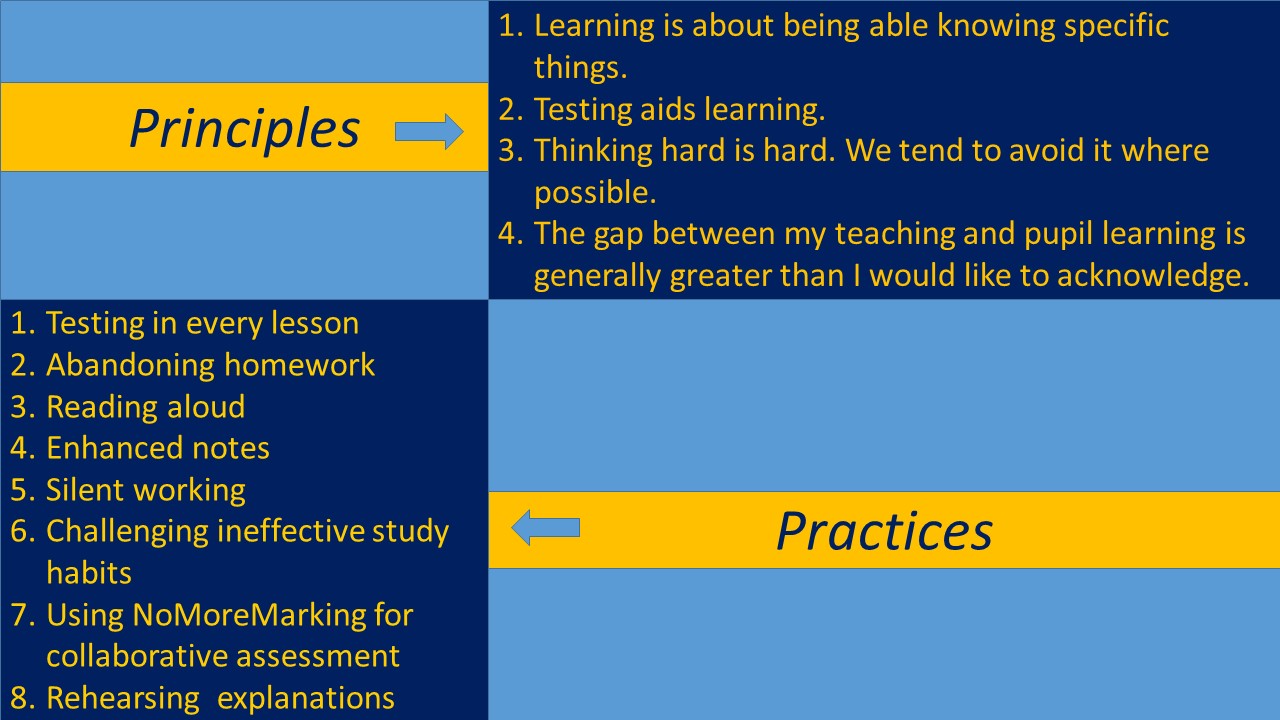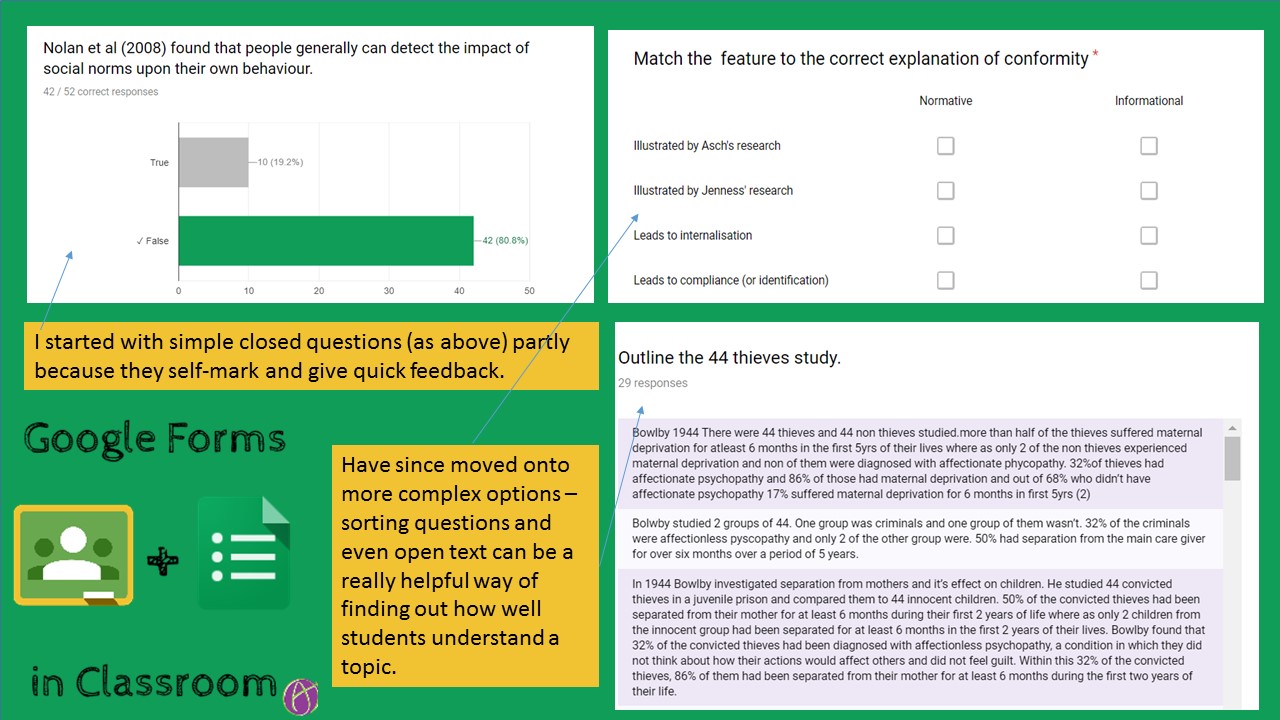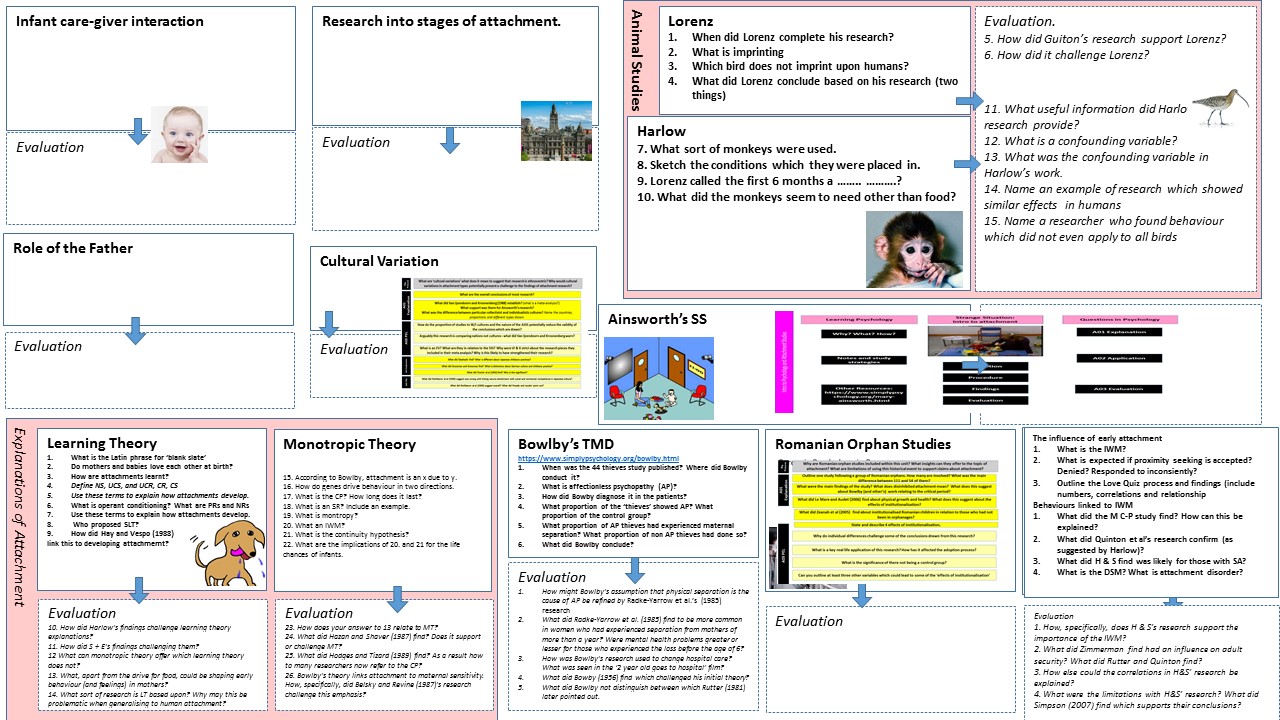‘I know what to expect in your lessons sir. They’re quite predictable’ Yr 12 Student. March 2018.
After ten years of teaching I’ve reached a point where a student can say this about my lessons AND I could construe it as a compliment!
In an earlier post I outlined a small-scale experiment with my own classes – and how it sparked changes to my teaching. I’m now going to describe those changes. I will identify four principles which underpin my teaching and 8 practices which are informed by them.
In the last couple of years in particular my teaching has changed quite significantly. I also enjoy it now more than I have for a long time, I feel like I’ve got a lot of improving to do – but that at least now I’m more directly focussed on making useful changes to my practice. I also think that teaching in this way is sustainable – as @MarkEsner argues in this piece
What was I told?
When I trained I was taught about the importance of snappy starters. They needed to be engaging and fun – and didn’t necessarily need to be anything to do with the subject. Thunks for example, warmed up pupils’ brains. This was bad advice. Especially for me being something of an idea gannet. I love unusual notions, interesting asides and anecdotes.
I’d like to think that I did make improvements early on as I learned more about my subject, about students, and about the day-to-day practicalities of teaching. However I also developed habits which seemed sensible to me – but which were never really tested or critiqued. Some are probably ok. Some are probably not.
More importantly – I was taught to be critical and to reflect on my own practice . On reflection this was probably the most useful ‘take-away’ from the course. I was (partly) able to both think about my next lesson and try and make it as good as I could whilst accepting that most likely, in a few years time I would look back on my early efforts as blunt and (relatively) ineffective.
What went without saying?
I knew that learning needed to be engaging. I knew that verbal, whole class questioning was a great route to deep thinking. I also knew that thinking skills could be taught – so time puzzling over tricky questions would help student get better at similar-shaped questions in other parts of the course. I accepted that learning really needed to be active and that outstanding lessons had a palpable buzz.
Furthermore, I am a little vain and enjoy making people laugh. Deep down I aspire to be seen as a sagacious comic. Not all bad perhaps. But also not entirely good – laughter and bewilderment in spades confirm (to me at least) my status as an erudite stand-up -but might not be quite what my novice students most need.
The above (truisms and character) probably influenced my teaching more than any four part lesson plan. Furthermore they very much went with the prevailing winds at the time – my observed lessons were generally graded outstanding. There was a palpable buzz in the room. However, these ‘outstanding’ lessons were draining and impossible to repeat daily let alone 4 or 5 times a day.
I’ve been interested in evidence-based practice for the past four or five years. However, would have to say that only recently has this led to changes to my established habits.
I recently listened to Dan Willingham’s excellent talk at ResearchED Ontario . One idea which struck me is the need for teachers to have a broad understanding of current broadly supported evidence regarding learning process.
The principles which previously informed my teaching were not explicit; they were skewed by speculation about what outsiders would like to see; and to be brutally honest, were based on an assumption that I needed to come up with creative ways of tricking students into learning the stuff.
Four Principles which inform my teaching
Four ideas have slowly filtered through to change the way I teach. Apologies for how obvious they may seem.
I am aware of the contingent nature of these principles – no doubt over time they will evolve as the research base continues to develop. As far as I understand it Willingham argues that, as a teacher, I don’t really need to know about the contested edges of cognitive science – in fact this aspect of research is probably best left to the researchers. However I can draw on the following three broad principles which are pretty well established in cognitive psychology.
- Learning is about knowing specific things. Unless a student knows these things then they will be unable to do the ‘fancy’ stuff – evaluate/analyse/contrast etc.
- Testing –and regularly recalling or thinking about ideas which I once knew or understood – can improve learning. Not thinking about ideas which we have heard or even used just once is a sure fire way of forgetting them.
- Thinking hard is hard. Where possible we try to avoid it.
- The gap between what the teacher thinks they are doing and how pupils interpret and experience the same thing is often larger than expected.
The first three ideas are informed by my reading of research and research summaries. The fourth is not really a ‘principle’ but it is something I’ve found fairly consistently with my own teaching – and I want to keep reminding myself to be open to refining and changing my practice more frequently.
Deliberately making principled changes to my practice feels more professional than following ‘what Ofsted want’; my own assumptions about good teaching; or my own tendency to seek validation of my sagacity!
8 Strategies I regularly use in lessons
The following were not a common feature of my lessons for 10 years. They are now. I think they make me a better teacher – but am also aware I’ll need to refine them further over time. I’ll outline each – with an example where possible – and will then flag up why I’ve started using it and what I want to improve on or develop. I’m going to unpack them over a series of 6 posts. Partly because three people have suggested that I do it – so it may prove helpful to others. Mainly because writing, helps me to clarify what I think – and refine what I actually do.

1.‘Testing’ in every lesson.
(Almost) every lesson starts with a review of information from the previous lesson. This at first was always the ‘purple pen challenge’ or variants of it – however over time I’ve started to include other variations. It took a while to get students on board. However I’m delighted to say that my most reluctant pupil now refers to them, albeit slightly tongue in cheek, no longer as ‘tests’ but as ‘low stakes quizzes’. Which is what they are. Also if, students are every early (or heaven forbid – me a little late) they’ll sit down and get straight down to reviewing the previous lesson’s work in prep for said questions.
Purple pen challenge: Five minutes or so recalling key themes/messages/facts from memory (using a purple pen). Five minutes adding missing content from original notes/summary (using a different coloured pen). Sometimes this is prompted with questions/boxes. Sometimes this is entirely from memory with just the topic as a prompt.
Short questions: Sometimes I’ll finish a lesson pointing out the specific short questions which we’ll start the next lesson answering. I currently oscillate between setting all these questions in the next lesson and giving students a longer list from which I will then select a handful.
Google forms (in quiz mode): Multiple choice and short answer questions can be set-up to self-mark. Open text answers also work really well because whilst you can view answers from each student the default setting shows all answers WITHOUT names so great for quick feedback and critical discussions without naming and shaming the author.
Example: Multiple choice and short answer quiz Google’s guide to writing a quiz: video tutorial

Knowledge organisers: I’ve tried to reduce topics to single page summaries – we review/learn the content in one lesson and students attempt to fill them in from memory in the next.
This is an A-level unit (1 of 8). Each section also has its own single page overview which goes into a little more detail.

Envelope challenge: For much of the year we’ve had an envelope challenge lesson once a fortnight with my year 13 Psychology classes. We take time out of learning new ‘year 13’ material to review topics first studied in year 12. There are two A3 envelopes linked to each topic in a large box. Once a fortnight, a student gets to pick an envelope at random. It includes short questions/exam questions or a blank knowledge organiser etc from said topic. Students spend twenty minutes working on it from memory then twenty minutes updating/marking (mark schemes or relevant notes are also included in the envelope. The last thing we do is decide on a useful further revision task
- Reviewing and/or repeating process if it was pretty weak.
- Taking content and applying to an exam question if they feel ready.
- Moving on to another topic if this one has gone really well.
The benefit here is all students had actually reviewed most of the year 12 course at least once by February. Most had then carried out follow up work relating to the envelope challenge after the lesson.
Why? I think that consistently starting with a check of previous learning will help reinforce (testing effect); will encourage useful study habits; and keeps me honest – we can’t rush on if students can’t get these questions right.
What next? I also want to be more systematic in including some questions from previous lesson and a handful from anywhere in the course so far. I hope to develop a Psychology version of @adamboxer1’s spreadsheet to make this more systematic next year…. https://achemicalorthodoxy.wordpress.com/2017/05/04/the-retrieval-roulette/ Since writing this post I’ve set up a trial of this for a module I’m teaching year 12 this term. Will be interesting to see how it pans out .I am also considering being more radical and shifting lessons around to harness the same effect using @danboorman’s spreasheet lesson plan generator.




Leave a comment